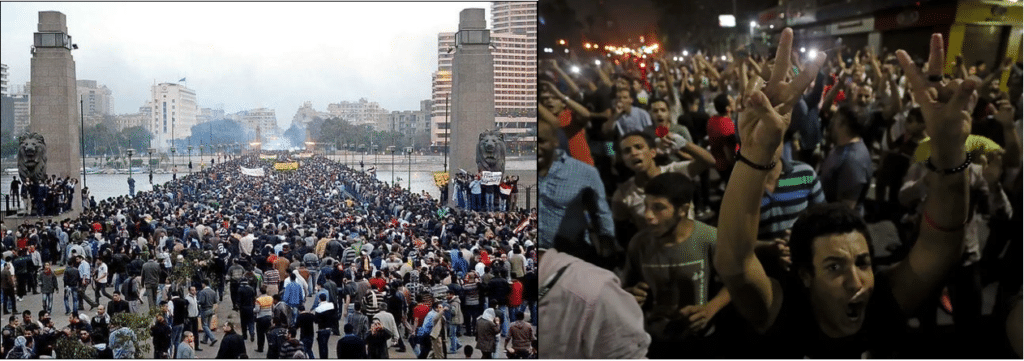 The media can be forgiven for practically ignoring burgeoning protests in Egypt against President Abdel-Fattah el-Sisi’s dictatorial rule. After all, not only do these protests seem like a groundhog-day spectacle; long-simmering protests in Hong Kong against China’s authoritarian rule must seem far more worthy of coverage, especially as they are now threatening to boil over.
The media can be forgiven for practically ignoring burgeoning protests in Egypt against President Abdel-Fattah el-Sisi’s dictatorial rule. After all, not only do these protests seem like a groundhog-day spectacle; long-simmering protests in Hong Kong against China’s authoritarian rule must seem far more worthy of coverage, especially as they are now threatening to boil over.
‘This means war’ [was the rallying cry reflecting] anger and division at school of student shot by HK police. …
They were speaking a day after the teenager was shot in the chest at point-blank range as he fought an officer with a metal pipe in Tsuen Wan district during some of the most violent clashes in Hong Kong since protests escalated in mid-June.
(Reuters, October 2, 2019)
I was in the vanguard of those commenting on the protests in Hong Kong – as the following titles attest:
- “Jasmine Revolution Simmering in China,” January 19, 2012
- “Hong Kong Protesters Raise Spectre of Tiananmen Square 2.0,” September 23, 2014
- “China Vows to Crush Hong Kong-Led Confederacy; and It Should,” November 15, 2016
- “China: Where Hong Kong Is Concerned, Britain Is Now Adrift at Sea,” July 1, 2017
- “Hong Kongers Are more Unruly Secessionists than Pro-Democracy Activists,” June 18, 2019
Still, I suspect it’s only a matter of time before the protests in Egypt boil over (again). In fact, Sisi is daring pro-democracy protesters there to do to him what they did to former President Hosni Mubarak; hence the title to this commentary, mirroring (in groundhog-day fashion) “Egyptians Continue March Back to the Future,” December 20, 2013.
But here is why they shall never cease from protesting:
Egypt’s president on Saturday dismissed corruption allegations made by a businessman-in-exile about the country’s military as ‘sheer lies and defamation.’ …
‘I’ve built presidential palaces and I will continue to do so,’ el-Sissi, a general-turned-president, said in televised comments. ‘I am building a new country. … All of this is not mine; it’s Egypt’s.’
(The Associated Press, September 14, 2019)
 Of course, Sisi insisting “all of this is not mine” is no more convincing than it would have been if Saddam Hussein had insisted the same at the height of his dictatorial rule over Iraq. At least Mubarak had enough respect for the poor Egyptian people that, instead of building pharaonic palaces in their faces, he laundered billions in other places.
Of course, Sisi insisting “all of this is not mine” is no more convincing than it would have been if Saddam Hussein had insisted the same at the height of his dictatorial rule over Iraq. At least Mubarak had enough respect for the poor Egyptian people that, instead of building pharaonic palaces in their faces, he laundered billions in other places.
President Hosni Mubarak’s family fortune could be as much as $70bn (£43.5bn) according to analysis by a Middle East expert, with much of his wealth in British and Swiss banks or tied up in real estate in London, New York, Los Angeles and along expensive tracts of the Red Sea coast.
(The Guardian, February 4, 2011)
As it happened, I warned those trying to overthrow Mubarak that his successor would likely prove far worse. I was obliged to cite this warning most recently in “Egypt’s Sisi Aping Russia’s Putin to Continue Serving … for Life,” March 26, 2018:
____________________
With all due respect to the protesters, the issue is not whether Mubarak will go, for he will. (The man is 82 and already looks half dead for Christ’s sake!) Rather, the issue is who will replace him. And it appears they have not given any thought whatsoever to this very critical question. …
The devil the Egyptians know might prove far preferable to the devil they don’t. Just ask the Iranians who got rid of the Mubarak-like Shah in 1979 only to end up with the Ayatollah Khomeini — whose Islamic revolution they’ve regretted (and have longed to overturn) ever since.
(“Army Pledges No Force Against Protesters,” The iPINIONS Journal, February 1, 2011)
Unfortunately, I’ve had too many occasions since then to say ‘I told you so.’ I could easily cite another twenty-five commentaries, but here are just five to give you a sense of how I chronicled Egypt’s descent into a dictatorship that makes Mubarak’s look like a liberal democracy:
- “Protesters Return to Tahrir Square,” June 6, 2012
- “Egyptians Continue March Back to the Future,” December 20, 2013
- “Egypt’s Arab Spring Spawns Brutal Military Dictatorship,” March 25, 2014
- “Dismissal of Mubarak’s Charges Brings Indian Summer for Egypt’s Arab Spring,” December 1, 2014
- “Egypt Sentences Morsi to Death: Exposes Fecklessness of US Mideast Policy,” May 20, 2015
For a little more edification, here is what I wrote in the December 2014 commentary on events that vindicated my warnings about the confluence of euphoria and myopia among Egypt’s pro-democracy protesters:
These are the same anti-government protesters who took to this same square last year to celebrate Sisi’s ouster of Morsi, and who did the same four years ago to call for the ouster of Mubarak.
Even so, the irony seems completely lost on them that, despite all of their revolutionary protests, the dismissal of all charges against Mubarak means that Egypt has ended up right where the Arab Spring was sprung.
But, if they think they can repeat against Sisi the miracle in Tahrir Square that led to the ouster of Mubarak, I have two words of admonition for these protesters: Tiananmen Square.
____________________
Given the above, I suspect you’ll agree that I have beaten this dead horse enough. Therefore, I shall reserve any further comment until Tahrir becomes Tiananmen or Sisi becomes Mubarak.
In the meantime, I fear Egypt’s pro-democracy protesters will have many reasons to continue protesting:
Egyptian authorities have launched the ‘biggest crackdown’ under President Abdel Fattah el-Sisi’s rule, according to Amnesty International, rounding up more than 2,300 people following a series of anti-government protests in late September. …
In addition to sweeping arrests of peaceful protesters, Egyptian authorities also carried out targeted arrests of journalists, activists and politicians.
(Aljazeera, October 2, 2019)
Even worse, Sisi is finding refuge in the authoritarian rhetoric of none other than President Trump – notably dismissing the charges of his pro-democracy critics as fake news. Which is why protesting Hong Kongers are in for a rude awakening if they’re waiting for Trump to champion their cause.
By instructive contrast, Mubarak found no refuge in the democratic rhetoric of former President Obama, which meant that Mubarak was unable to reconcile his dictatorship with the democratic demands of the increasingly restive Egyptian people.
Related commentaries:
jasmine revolution…
Hong Kongers…
Sisi aping Putin…
Egypt march back…

